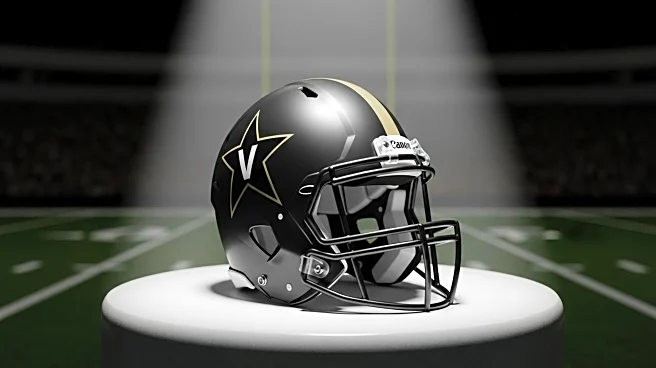What is the story about?
What's Happening?
Vanderbilt University's football program has undergone a significant transformation under the leadership of head coach Clark Lea. Once considered the Southeastern Conference's (SEC) perennial underdog, the Commodores have emerged as a competitive force. This change is attributed to strategic investments in the athletic department, including a $300 million Vandy United campaign, which has funded extensive facility upgrades and enhanced recruitment efforts. The team's recent success, highlighted by a 5-0 start to the season and a victory over Alabama, marks a departure from its historical struggles. The program's turnaround is part of a broader shift in Vanderbilt's approach to athletics, emphasizing a balance between academic excellence and competitive sports.
Why It's Important?
The resurgence of Vanderbilt's football program is significant for several reasons. It challenges the traditional narrative that elite academic institutions cannot excel in athletics, particularly in a competitive conference like the SEC. This transformation could inspire similar institutions to invest in their athletic programs, potentially altering the landscape of college sports. For Vanderbilt, the success enhances its national profile, attracting more students and alumni support. It also demonstrates the potential benefits of strategic investments in sports infrastructure and recruitment, which could lead to increased revenue and prestige for the university.
What's Next?
Vanderbilt faces the challenge of maintaining its newfound success. The program must continue to leverage its resources effectively, particularly in the areas of recruitment and facilities. The upcoming games against top-ranked teams will test the Commodores' resilience and ability to sustain their performance. Additionally, the university will need to navigate the complexities of the Name, Image, and Likeness (NIL) era, ensuring that it remains competitive in attracting top talent. The administration's commitment to balancing athletics with academic integrity will be crucial in sustaining this momentum.
Beyond the Headlines
Vanderbilt's transformation reflects broader trends in college athletics, where the lines between amateur and professional sports are increasingly blurred. The university's success could prompt discussions about the role of athletics in higher education, particularly regarding the ethical implications of prioritizing sports in academic settings. Furthermore, the shift in Vanderbilt's athletic culture may influence other institutions to reevaluate their strategies, potentially leading to a more competitive and diverse landscape in college sports.
















